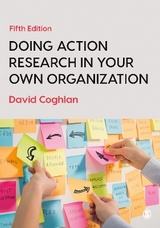
Doing Action Research in Your Own Organization
SAGE Publications Ltd (Verlag)
978-1-4462-7256-5 (ISBN)
- Titel erscheint in neuer Auflage
- Artikel merken
The Fourth Edition of this best-selling book is packed full of practical, expert advice on how to navigate the murky waters of ethics, politics and management in your own organization. Multidisciplinary in its approach to action research, the book sets out a step-by-step template for researchers to follow and adapt.
Coghlan and Brannick:
Introduce and contextualize action research as a method
Provide guidance on how to design and implement your action research project
Explore interlevel dynamics
Discuss role duality and access
Suggest effective ways to analyze your data
Provide helpful tips on how to disseminate your findings.
The book and supporting companion website are the ideal resource for students, researchers and practitioners hoping to generate real change through their action research project and will be particularly relevant to those studying Business and Management, Nursing and Health, Education and Sociology.
David Coghlan is a Professor Emeritus and Fellow Emeritus at the Trinity Business School, Trinity College Dublin, Ireland. He is author of over 250 articles and book chapters. Recent books include: Collaborative Inquiry in Organization Development and Change (with A.B. Shani, Edward Elgar, 2021), Doing Action Research in Your Own Organization (5th ed. Sage 2019); Conducting Action Research for Business and Management Students (with A.B. Shani, Sage 2018), Inside Organizations (Sage, 2016) and he is co-editor of The Sage Encyclopedia of Action Research (2014) and the 4 volume set, Action Research in Business and Management (A.B. Shani, Sage, 2016). He serves on the editorial advisory boards of several journals. Teresa Brannick (1950-2012) was a lecturer in the business research programme at the Michael Smurfit Graduate School of Business at University College, Dublin, Ireland. Her undergraduate degree was in mathematics, her masters in sociology and her Ph.D. in marketing research. She had been a practising researcher for over thirty years and had published over thirty research papers in such diverse fields as epidemiology, public policy, industrial relations and marketing. She was the editor-in-chief of Irish Journal of Management and a Fellow of the Irish Academy of Management. She was co-editor of Business Research Methods: Theories, Techniques and Sources (Oak Tree Press: Dublin, 1997).
PART ONE: FOUNDATIONS
Introducing Action Research
Inquiring in your own organization
A brief introduction to action research
Three audiences, voices or practices
Enacting action research cycles
The action research cycles
Pre-step: context and purpose
Main steps
Meta-learning
Quality and rigour in action research
Conclusions
Recommended reading
Exercise 1.1: Enacting the action research cycles
Knowing in Action
Knowing and learning
General empirical method
Authenticity
Action science and collaborative developmental inquiry as first-person practice
Second-person skills
Conclusions
Recommended reading
Exercise 2.1 First-person knowing in action
Exercise 2.2 Keeping a journal
Exercise 2.3 Developing inquiry skills
Understanding Action Research
Action Research as practical knowing
The foundations of action research
The philosophy of action research
Modalities of action research
Organization development through action research
Conclusions
Recommended reading
PART TWO: IMPLEMENTATION
Constructing and Selecting Your Insider Project
Constructing the action research project
Selecting the research project
Writing an insider action research proposal
Developing the action research
Conclusions
Recommended reading
Exercise 4.1 Questions for constructing and selecting
Exercise 4.2 Writing a thesis proposal
Designing and Implementing Your Action Research Project
The process of planned change
Planned change through action research
Learning mechanisms
Data generation as intervention
The role of technology
How do you know when to stop?
Conclusions
Recommended reading
Exercise 5.1 The process of implementation
Exercise 5. 2 Reflection for praxis
Interlevel Dynamics in Insider Action Research
Interlevel dynamics of change
Interlevel dynamics of strategy
Levels of analysis in action research
Conclusions
Recommended reading
Exercise 6.1 Applying interlevel dynamics
Exercise 6.2 Change issues
Exercise 6.3 The learning window
Using Frameworks to Study Organizations in Action
Organizational diagnosis
Systems thinking and practice
Change and learning
Conclusions
Recommended reading
Exercise 7.1 Understanding Your Organization
Exercise 7.2 Using Systems Thinking
PART THREE: ISSUES AND CHALLENGES IN RESEARCHING YOUR OWN ORGANIZATION
Researching Your Own Organization
Focus of the researcher and system
Quadrant 1
Quadrant 2
Quadrant 3
Quadrant 4
Action Research at Home
Conclusions
Recommended reading
Exercise 8.1 Assessing your research focus
Preunderstanding, Role Duality and Access
Preunderstanding
Role duality: Organizational and researcher roles
Access
Conclusions
Recommended reading
Exercise 9.1 Assessing Your Preunderstanding
Managing Ethics and Organizational Politics
Ethics
Politics
Integrating roles, politics and ethics
Conclusions
Recommended reading
Exercise 10.1 Assessing ethics and politics
Exercise 10.2 Force field analysis
Writing up Your Insider Action Research Work
An action research dissertation
Constructing and writing your dissertation
Dissemination
Publishing
Conclusions
Recommended reading
In Conclusion
| Erscheint lt. Verlag | 20.3.2014 |
|---|---|
| Verlagsort | London |
| Sprache | englisch |
| Maße | 170 x 240 mm |
| Gewicht | 550 g |
| ISBN-10 | 1-4462-7256-7 / 1446272567 |
| ISBN-13 | 978-1-4462-7256-5 / 9781446272565 |
| Zustand | Neuware |
| Informationen gemäß Produktsicherheitsverordnung (GPSR) | |
| Haben Sie eine Frage zum Produkt? |
